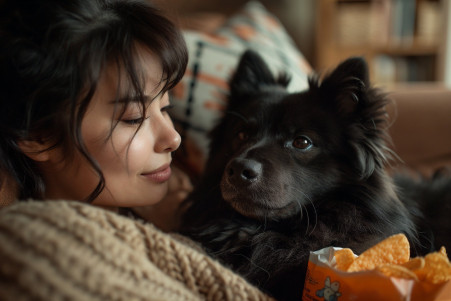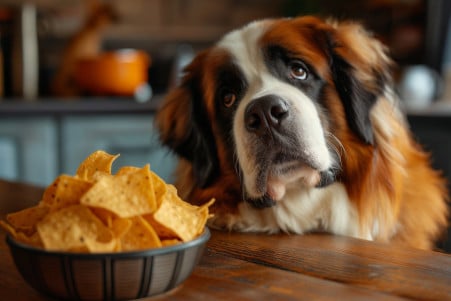Can Dogs Eat Takis? Understanding the Risks of Spicy Snacks
17 February 2024 • Updated 16 February 2024

Takis have taken over the snack aisles, but can you share them with your dog? No, dogs cannot eat Takis because they are loaded with sodium, spices, and ingredients that are toxic to dogs, including onion and garlic powder. These ingredients can lead to gastrointestinal upset, pancreatitis, and anemia in dogs. Instead, always opt for dog-friendly treats.
This article will take a deeper dive into the nutritional and health implications of feeding dogs human snack foods like Takis. Drawing on research from veterinary nutrition, toxicology, and canine health, we will offer a well-rounded perspective that explains why certain human foods are bad for dogs and what options exist to ensure dogs have a healthy, balanced diet.
Can dogs eat Takis?
The Dangers of Spicy Snacks for Dogs
For dogs, the combination of Takis and other spicy snacks is more than just unappetizing—it’s potentially dangerous. The Pet Poison Helpline explains that ingredients like garlic and onion powder, which are commonly found in spicy snacks, are poisonous to dogs. These substances contain thiosulfate, which can cause oxidative damage to red blood cells and result in hemolytic anemia, a condition that can be fatal.
In addition, capsaicin, the active ingredient in chili peppers that makes them spicy, can cause a number of problems in a dog’s digestive system. In fact, experts say that gastrointestinal upset, which can include vomiting, diarrhea, and abdominal pain, is common in dogs who have ingested spicy foods.
If your dog has ingested something spicy, you may notice signs of distress like lethargy or panting. In these cases, it’s important to watch the dog closely and contact a vet, especially if a large amount was consumed.
Getting professional help right away can help avoid complications from ingredients that are more than just unappetizing. After all, it’s important to make sure that dogs are eating a safe and healthy diet, and that includes avoiding human foods that can be more harmful than tasty for our furry friends.
Nutritional Needs of Dogs vs. Human Snacks
Dogs are omnivores and require a balanced diet that includes proteins, fats, carbohydrates, vitamins, and minerals. An infographic by VCA Animal Hospitals shows just how different a dog’s nutritional needs are from the ingredients in human snacks like Takis. Not only do these snacks not contain the nutrients dogs need, but they also contain high levels of fats and simple carbohydrates that can lead to obesity and malnutrition in dogs.
Human snacks also don’t meet the standards set by the Association of American Feed Control Officials (AAFCO), which PetMD explains are in place to make sure that commercial pet foods contain the right nutrients for dogs at different life stages. This includes the right balance of essential nutrients, which human snacks can’t guarantee.
By feeding dogs human snacks instead of food that’s appropriate for their species, dog owners can put their pets’ health at risk and cause long-term problems. The Clinical Nutrition Service at Cummings School explains that a balanced diet that meets the AAFCO standards is essential for dogs to stay healthy.
This means that dog owners should focus on feeding their pets high-quality dog food that’s tailored to their pets’ individual needs and life stages and avoid human snacks that don’t contain the right nutrients for dogs.
The Role of Sodium in a Dog’s Diet and the Dangers of Too Much
Sodium is an important electrolyte in a dog’s diet that helps regulate fluid balance and supports proper nerve and muscle function. However, the American Kennel Club explains that too much salt can cause salt toxicosis or hypernatremia, which can be fatal. This occurs when high levels of sodium in the blood cause the body’s cells to lose water, which can lead to damage in the brain and nervous tissue.
The signs of salt toxicosis, which can include increased thirst, seizures, and lethargy, can be fatal. This is especially true when it comes to high-sodium human snacks like Takis, which contain much more salt than a dog’s diet should. Hill’s Pet explains that it’s especially important to watch sodium intake in older dogs and dogs with kidney or heart issues, as these can make the effects of salt even worse.
To avoid salt toxicosis, it’s important to make sure your dog’s diet doesn’t contain too much sodium. This includes not giving them high-sodium human snacks and making sure they always have fresh water. By focusing on a well-balanced diet that meets a dog’s nutritional needs, dog owners can help protect their pets from the dangers of too much salt.
Junk Food: A General Overview of Dog Nutrition
Many junk foods that humans eat are not good for dogs. While some can be eaten in moderation, like unseasoned, cooked meats and some vegetables, others can be dangerous. For example, the American Kennel Club warns against giving dogs chocolate because it contains theobromine, which dogs cannot break down. Meanwhile, onions and garlic contain compounds that can lead to anemia in dogs, according to Healthline.
Dog owners need to be aware of food toxicity to make sure their dogs stay safe. Many foods that are safe for people can be toxic or even deadly to dogs because of differences in metabolism. According to PetMD, even foods that aren’t toxic in the short term can lead to long-term health problems like obesity and obesity-related diseases because of the extra calories they contain.
To make sure your pet stays safe, only give them treats that are specifically made for dogs and talk to your vet to find out which human foods are safe. Also, make sure that potentially dangerous treats are stored in a place where your dog can’t get to them.
Keep an eye on how much of them your dog eats. After all, what’s a treat for you could be a problem for your pup.
Healthy Alternatives to Dog Treats
While it’s important to make sure that you’re giving your dog treats that they’ll enjoy, it’s also important to make sure that the treats you give them are healthy. The ASPCA notes that dogs need a balanced diet, and most commercial dog foods are designed to provide just that.
However, if you’re looking to give your dog a little something extra, there are plenty of healthy, safe options that will also provide them with some nutritional benefits. For example, both carrots and blueberries are safe for dogs and are good sources of vitamins and fiber, according to Healthline.
Like with humans, dogs need a balanced diet that includes a variety of foods. This will help ensure that they don’t become overweight and that they get all of the nutrients that they need.
That said, there are some human foods that can be given to dogs as an occasional treat that can also help ensure that they get the nutrients that they need. For example, the AKC suggests that small pieces of cooked chicken or salmon can be given to dogs as a treat.
Both of these options are good sources of protein and omega-3 fatty acids, which can help keep your dog’s skin and joints healthy. That said, it’s important to make sure that you’re only giving your dog human food that’s safe for them to eat and that you’re giving it to them in moderation.
If you’re ever in doubt about what you should be feeding your dog, make sure to talk to your vet. They’ll be able to give you personalized recommendations that will help ensure that your dog is getting the nutrients that they need without being exposed to the potential dangers of unhealthy treats.
That said, by making sure that you’re giving your dog healthy treats, you’ll be able to make sure that you’re keeping them happy and healthy.
Final Thoughts on Dogs and Takis
Based on what we know about the canine diet, it’s safe to say that human snacks, especially ones like Takis that are spicy and high in sodium, are not good for dogs. The potential health problems that can arise from dogs eating Takis range from gastrointestinal issues to more serious problems like pancreatitis and anemia.
Dogs need a diet that is very different from humans, and it should be well-balanced with plenty of protein, vitamins, and minerals, and low in salt and spices.
It’s up to us as pet parents to make sure that we’re looking out for the best interests of our dogs by feeding them the right kind of diet and not giving in to the temptation to share our snacks with them. By following the dietary guidelines for dogs, we can avoid the health problems that come with poor nutrition and toxic ingredients.
In the end, it’s important to make sure that we’re making the right dietary choices to keep our pets healthy and safe. Make sure to talk to your vet to make sure that your dog is eating a diet that is right for them.
And remember, just because a treat seems innocent doesn’t mean that it won’t have a big impact on your dog’s health. Let’s make sure that we’re feeding them the best food that’s made just for them.


